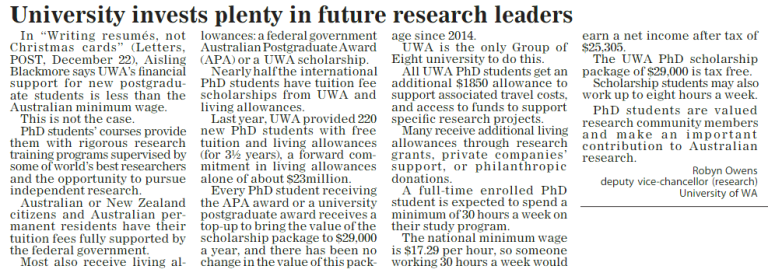UWA’s representatives claim that research students are not working for less than minimum wage, because they are only working 30 hours per week.

Most research students are supported by $29,000.00 annually, tax free.
So on the surface, our claim is not supported. But this analysis is slightly disingenuous because the key words in Deputy Vice-Chancellor Owens’ letter are “a full-time enrolled PhD student is expected to spend a minimum of 30 hours per week on their study program.” Owens then uses the minimum assumption to support her argument that UWA is not offering less than the minimum wage.
Let’s look at this assumption in some more depth.
Below is a table detailing the minimum hours each Group of Eight university expects a full-time higher degree by research student to put in, organised from lowest to highest.
| Group of Eight Institution | Full-time research student hours per week | Citation |
| UWA | Minimum 30 hours per week | Point 12, http://handbooks.uwa.edu.au/rules?id=56045 |
| Monash | At least 4 days each week between Monday to Friday inclusive and during normal business hours on each of those days
[4 days x 8 hour day = 32 hours per week] |
Point 3.4.1.1, https://www.monash.edu/graduate-research/faqs-and-resources/content/chapter-three/3-4 |
| USyd | At least the equivalent of a 35-hour working week | http://sydney.edu.au/medicine/current-students/essential-information/faqs/index.php#diff-part-full |
| Adelaide Uni | Full-time research candidates are expected to keep the same hours as a member of University staff, (nominally, 36.75 hours per week) | Page 13, https://www.adelaide.edu.au/graduatecentre/handbook/docs/rsch_handbook.pdf |
| UNSW | 35-40 hours per week | https://research.unsw.edu.au/doctor-philosophy-phd |
| UQ | Full time students are expected to study for at least the equivalent of a standard five-day working week
[5 days x 8 hour day = 40 hours per week] |
Point 10, http://www.uq.edu.au/grad-school/faq |
| UniMelb | At least 40 hours per week | http://ask.unimelb.edu.au/app/answers/detail/a_id/836/~/doing-a-phd-without-a-scholarship |
| ANU | At least 40 hours per week on average | Point 24, https://policies.anu.edu.au/ppl/document/ANUP_000724 |
- UWA is the only Group of Eight university advising students that they can complete a research degree only working 30 hours per week. Every other university in this list exceeds that amount as their bare minimum expectation from students.
- Four universities, including the two top ranked universities ANU and The University of Melbourne, advertise 40 hours per week as the requirement for completing a research degree.
- If you work 40 hours per week, every week, you would earn $32,314.20 per year after tax.
UWA is being disingenuous by using 30 hours per week as the basis for their calculation. It is clearly not the national or international standard if 50% of the Group of Eight expect a much higher weekly workload. The experience of postgraduate research students is also much different to 30 hours per week completed Monday to Friday between 8am and 6pm. Research students work early mornings and late into the night, weekdays and weekends – at home, in archives, in cubicles, in laboratories. They don’t get public holidays or mandatory shut downs, they really are working 52 weeks of the year.
There is no publicly available research on the hours put in by research students during their candidature, though we know UWA has some records which would give an indication. We’ve set up our own straw poll so you can tell us how much time you spend on your candidature each week.
Unless UWA postgraduates work far less than those in every other Group of Eight university, research students are working more than 30 hours per week, every week. That is why we are confident in saying they are working not only below the poverty line, but also for less than minimum wage.

Robyn Owens comments are patently ridiculous, and I’m amazed that someone ostensibly in charge of research would contend that 30 hours a week is a reasonable assessment of the workload of a PhD student.
She should ask a variety of supervisors at UWA to see if they think the 30 hour figure is reasonable. The vast majority, I am sure, would characterise that as totally inadequate. Certainly in science, we are expected to work a full working week (35-40). In addition, it is expected that we will consistently come in late at night or over weekends during periods where we have a large number of experiments or experiments with specific time demands.
I wonder whether she actually believes what she is saying (surely someone with a PhD and a knowledge of how science works globally cannot be that ignorant?
LikeLiked by 1 person
Thank you for commenting! We really appreciate other postgrads sharing their experience.
LikeLike